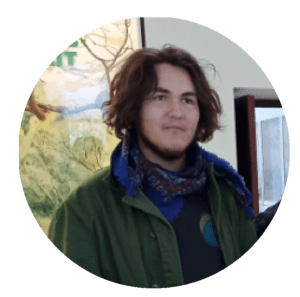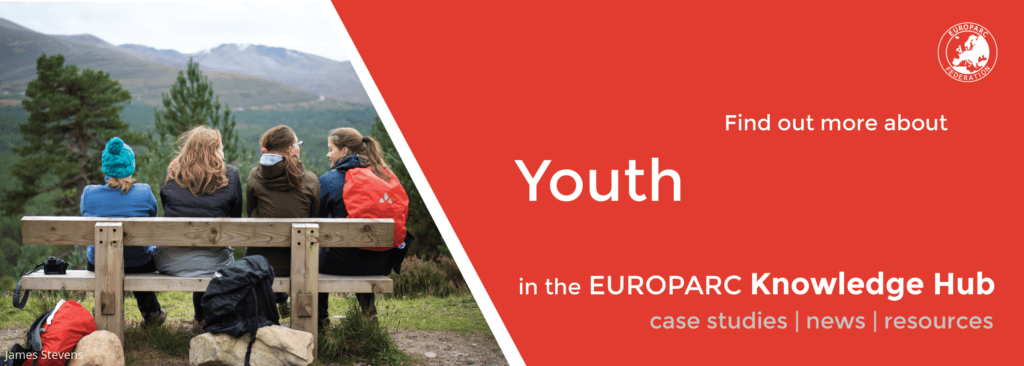Youth+ in Estonia establish their own NGO!
Second meeting of the Association in Matsalu National Park © Kalle Kõllamaa
In 2020 a group of young people active in the Youth+ Programme in Estonia came together to establish their own NGO Eesti Rahvusparkide Noorte Looduskaitsjate Selts (Association of Young Conservationists of Estonian National Parks). On that occasion, we interviewed one of the founding members Uku Freiberg.
Get Youth Involved!
At EUROPARC we believe that involving Young People at all levels of Protected Area management is essential. Apart from our successful Junior Ranger programme, we launched the Youth Manifesto in 2018. Written by young people from all over Europe, it is a starting point for Parks to start involving and empowering young people in Protected Area management. Additionally, it aims to tackle problems young people face in rural areas.
The Youth+ programme is one way for Parks to implement the Manifesto. It aims to help young people develop their leadership, communication, advocacy and nature conservation skills and offers them a chance to stay active in their Park when they can no longer participate in Junior Ranger programmes.
We were delighted to hear that Youth+ in Estonia are putting exactly these skills to use by establishing their very own NGO! The Association of Young Conservationist of Estonian National Parks allows these young people (aged 17-22) to gain independence and additional motivation for contributing to nature protection in Estonia. Below you can read a small interview with founding member Uku Freiberg on the importance of involving youth in Parks and Protected Areas and what they hope to achieve with their NGO.
Inspired?
Then why not start implementing the EUROPARC Youth Manifesto or Youth+ programme in your area?
or show how your Park is #StrongerWithYouth by using the hashtag on social media!
Interview with Uku Freiberg
How did you get involved in your Protected Area?
My interest in nature started because I live in Karula National Park. Over the years I have come to value the nature around me and seeing nature disappearing everywhere else caused me to worry about it. Also when I was little I often went hiking and I spent a lot of my time outside. I think that’s where my love and interest for nature mostly came from.
Why do you believe it is important to involve youth in Protected Areas?
I think that if we involve young people into protected areas they get a connection with nature and so when they grow older they know to value it more. In the future, when these young people are grown up and living their lives, maybe then they will take better care of nature than the leaders today. I hope that is more likely to happen when they have some touch or connection with nature and its charm and pain.
How do you think Protected Areas can best involve young people?
In my opinion when involving young people it is important to make them understand the value of nature. We are not winning anything if there are a number of young people who for example know that deforestation is bad, but they have never been in forest and they have no connection with it. They know the problem, but if they have no experiences with that topic they can’t relate to it so well.
How did the idea to start the Association of Young Conservationists of Estonian National Parks come to be amongst the Youth+ participants?
The founding members are all former Junior Rangers. The idea to participate with Youth+ came, because we believe that the more the natural protection organizations cooperate, the more we can make a change. Additionally, our interest and Youth+’s interests are similar, so such a solution would make the most sense in our opinion 🙂
Who can be part of the NGO? Who are the current members?
To become part of our NGO you must be between 16 and 29 years old and have previously attended Junior Ranger courses. And after he or she has joined, the member will represent one of the Estonian national parks where they participated in Junior Ranger courses.
What kind of activities are you organising / do you want to organise?
We would like to organise nature protection schoolings and practical nature protection activities like cleaning black strokes feeding areas or maintaining wood meadows. These activities are mainly targeted for young people to become more sustainable and more environmentally friendly.
How do you reach new audiences?
Currently, we just try to spread our NGO name hoping that young people who have the same interest as us, will join. Because we are still a young organisation we haven’t made a big advertisement so far.
What has the Association achieved so far?
So far we have gathered together a group of young people who are so interested in nature protection that they want to actively support it. Also, we made a mailing list, so when someone who has a good idea or needs help to do something related to nature conservation, this information can be shared with other members. Additionally, we have carried out a contest that lasted the entire month of January. The contest included nine challenges about reducing our ecological footprints. On every Monday and Thursday we gave new challenges, for example how to reduce food waste or where to get your broken things fixed, rather than just buying new ones. And most active participants got rewarded at the end of the month.
What does the Association hope to achieve?
We hope to raise society’s environmental awareness and make the young people’s voice heard about environmental issues. Also we hope to get more young people involved with practical nature protection.
What do you think needs to change in order to draw more young people to nature conservation?
To draw more young people to nature conservation in my opinion the influence must start at home. It is more likely for young people to get in touch with nature conservation if they have parents who either deal with that topic or who just know how important it is. I am not saying it is impossible for young people who don’t have parents with such interest to get connected with nature conservation, but it helps a lot when they have parents who have that kind of connection with nature.
What do you think is the most important skill young people need if they want to work for nature?
To work for nature I think it is very important to have a connection with it, something that you like about nature and something that you want to keep from disappearing. Without it, I don’t really believe working for nature is for you. If you do not have a connection with it then you’re not going to put 100% in it and that is not going to work. Working for nature requires a lot of persistence.
Things will not change overnight and you have to make sure that after a long time of steadiness you still have the will and strength to keep it going.
I believe that connection with nature and persistence are the skills that you will need to work for nature.
What is your tip to other young people in Europe that want to contribute to a more sustainable world?
Collaboration.
You can follow the Association on Facebook and Instagram under @nooredlooduskaitsjad
Is your Park implementing the Youth Manifesto or taking part in the Youth Programmes of EUROPARC? Do you have a best practice example we should highlight? Then contact us under communications @ europarc.org!
The creation of the NGO is also a case study in EUROPARC’s Knowledge Hub! Check it out here:

